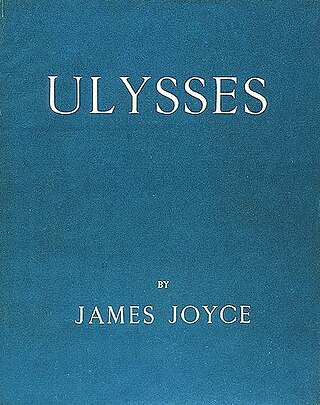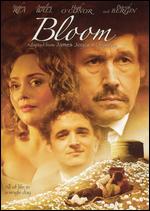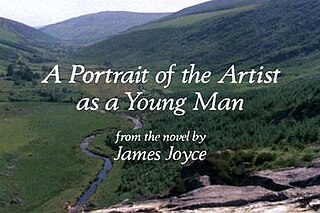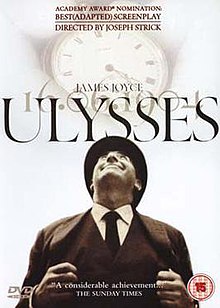
Ulysses is a modernist novel by the Irish writer James Joyce. Parts of it were first serialized in the American journal The Little Review from March 1918 to December 1920, and the entire work was published in Paris by Sylvia Beach on 2 February 1922, Joyce's fortieth birthday. It is considered one of the most important works of modernist literature and has been called "a demonstration and summation of the entire movement". According to the writer Declan Kiberd, "before Joyce, no writer of fiction had so foregrounded the process of thinking".

Leopold Bloom is the fictional protagonist and hero of James Joyce's 1922 novel Ulysses. His peregrinations and encounters in Dublin on 16 June 1904 mirror, on a more mundane and intimate scale, those of Ulysses/Odysseus in Homer's epic poem: The Odyssey.

Bloomsday is a commemoration and celebration of the life of Irish writer James Joyce, observed annually in Dublin and elsewhere on 16 June, the day his 1922 novel Ulysses takes place on a Thursday in 1904, the date of his first sexual encounter with his wife-to-be, Nora Barnacle, and named after its protagonist Leopold Bloom.

A Portrait of the Artist as a Young Man is the first novel of Irish writer James Joyce, published in 1916. A Künstlerroman written in a modernist style, it traces the religious and intellectual awakening of young Stephen Dedalus, Joyce's fictional alter ego, whose surname alludes to Daedalus, Greek mythology's consummate craftsman. Stephen questions and rebels against the Catholic and Irish conventions under which he has grown, culminating in his self-exile from Ireland to Europe. The work uses techniques that Joyce developed more fully in Ulysses (1922) and Finnegans Wake (1939).

Stephen Dedalus is James Joyce's literary alter ego, appearing as the protagonist and antihero of his first, semi-autobiographic novel of artistic existence, A Portrait of the Artist as a Young Man (1916), and as a major character in his 1922 novel Ulysses. Stephen mirrors many facets of Joyce's own life and personality. Joyce was a talented singer, for example, and in Ulysses Leopold Bloom notes the excellence of Stephen's tenor voice after hearing him sing Johannes Jeep's song "Von der Sirenen Listigkeit".
Joseph Ezekiel Strick was an American director, producer and screenwriter.

Molly Bloom is a fictional character in the 1922 novel Ulysses by James Joyce. The wife of main character Leopold Bloom, she roughly corresponds to Penelope in the Odyssey. The major difference between Molly and Penelope is that while Penelope is eternally faithful, Molly is not. Molly is having an affair with Hugh 'Blazes' Boylan. Molly, whose given name is Marion, was born in Gibraltar on 8 September 1870, the daughter of Major Tweedy, an Irish military officer, and Lunita Laredo, a Gibraltarian of Spanish descent. Molly and Leopold were married on 8 October 1888. She is the mother of Milly Bloom, who, at the age of 15, has left home to study photography. She is also the mother of Rudy Bloom, who died at the age of 11 days. In Dublin, Molly is an opera singer of some renown.

Milo Donal O'Shea was an Irish actor. He was twice nominated for the Tony Award for Best Actor in a Play for his performances in Staircase (1968) and Mass Appeal (1982).

Siobhán McKenna was an Irish stage and screen actress.
John Maurice Roëves was a British actor. He appeared in over 120 film and television roles, in both the United Kingdom and the United States. His breakthrough performance was as Stephen Dedalus in the 1967 film adaptation of James Joyce's Ulysses. He was a regular fixture on BBC and BBC Scotland programmes, often portraying what The Guardian called "tough guys, steely villains or stalwart military figures with directness, authenticity and spiky energy".

Hidden Agenda is a 1990 political thriller film directed by Ken Loach with a screenplay by Jim Allen. The film stars Frances McDormand, Brian Cox, Brad Dourif, Maurice Roëves, Ian McElhinney, Mai Zetterling and Michelle Fairley. The plot follows the investigation of a killing in Northern Ireland by British security forces.
Reginald Mills was a British film editor and one-time film director with more than thirty feature film credits. Among his prominent films are The Red Shoes (1948), for which he received his only Academy Award nomination, The Servant (1963), and Romeo and Juliet (1968).
Malachi Roland St. John "Buck" Mulligan is a fictional character in James Joyce's 1922 novel Ulysses. He appears most prominently in episode 1 (Telemachus), and is the subject of the novel's famous first sentence: "Stately, plump Buck Mulligan came from the stairhead, bearing a bowl of lather on which a mirror and a razor lay crossed."
Fred Haines was an American screenwriter and film director.

Bloom is a 2003 Irish film written and directed by Sean Walsh, based on the 1922 novel Ulysses by James Joyce. The film premiered at the 2003 Taormina Film Festival. Angeline Ball won the award for "Best Actress in a Film" at the Irish Film and Television Awards. The soundtrack was written and produced by David Kahne.

The Ulysses broadcast occurred on Bloomsday 1982 when the Irish state broadcaster, RTÉ Radio, transmitted an uninterrupted 30-hour dramatised radio performance, by 33 actors of the RTÉ Players, of the entire text of James Joyce's epic 1922 novel, Ulysses, to commemorate the centenary of the author's birth. The broadcast was carried by live relay internationally and won a Jacob's Broadcasting Award in recognition of its achievement.

A Portrait of the Artist as a Young Man is a 1977 film adaptation of Irish novelist James Joyce's 1916 novel of the same name, directed by Joseph Strick. It portrays the growth of consciousness of Joyce's semi-autobiographical character, Stephen Dedalus, as a boy and later as a university student in late nineteenth-century Dublin.
James Joyce's Women, filmed in 1982 and 1983, is a 1985 released British/Irish period drama film produced by and starring Fionnula Flanagan as writer James Joyce's wife Nora and some of the real women in Joyce's life and fictional women from the writer's novels. The film is based on Fionnula Flanagan's 1977 play James Joyce's Women.
Amalia Popper was the first Italian translator of James Joyce's works and author of his first biography, published as an introduction to his translation of Dubliners, published in 1935 in Trieste under the title "Araby".












